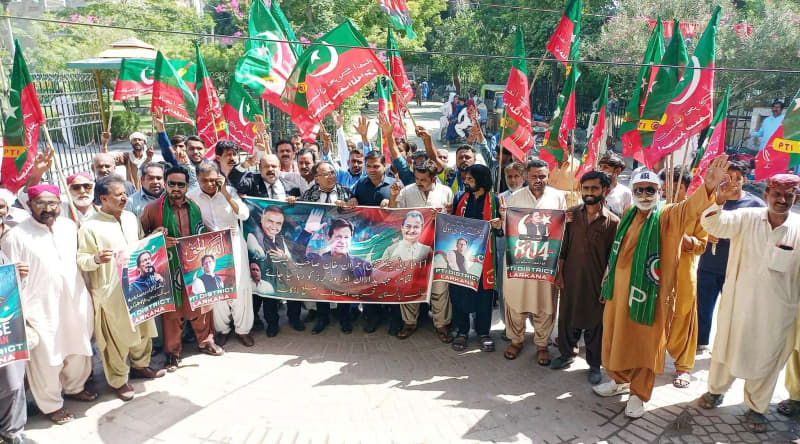Tensions have escalated in Pakistan’s capital as supporters of the imprisoned former Prime Minister Imran Khan engaged in violent clashes with riot police and paramilitary forces for the second consecutive day. The unrest has intensified following Khan’s incarceration, with his political party, the Pakistan Tehreek-e-Insaf (PTI), claiming the recent arrest of Khyber Pakhtunkhwa’s chief minister, Ali Amin Gandapur, was unlawful. Syed Zulfi Bukhari, a PTI member currently residing in the UK, criticized the government’s actions as an “attack on the federation,” highlighting the broader implications these events could have on Pakistan’s political unity and stability. The current situation symbolizes a critical turning point in the nation’s political dynamics with growing unrest among Khan’s supporters, who are rallying against what they perceive as an unjust imprisonment.
As protests unfolded, demonstrators faced aggressive tactics from security forces, including the use of tear gas to disperse crowds gathered in agitation against Khan’s arrest. The tensions prompted the authorities to take drastic measures to quell the unrest; they imposed extensive restrictions across Islamabad by blocking all access points with shipping containers and suspending mobile and internet services. Educational institutions in the capital were forcibly closed down, underscoring the serious implications on day-to-day life for residents, who found their streets unusually deserted amidst the chaos. The crackdown on protests was not limited to Islamabad – the eastern city of Lahore echoed similar disturbances, including the establishment of roadblocks in response to the protests.
In a further escalation of the situation, the Pakistani military was deployed to the capital in an effort to restore order as preparations ramped up for the upcoming Shanghai Cooperation Organization (SCO) summit set to take place later this month. Security forces, backed by army personnel, found themselves at the frontline to confront the swelling numbers of PTI supporters who remained undeterred by the measures intended to suppress their demonstrations. Despite the government’s attempt to limit participation in protests, crowds remained motivated to march toward the parliament house, a site historically significant for PTI, where they organized a prolonged sit-in for 126 days in 2014.
Government officials responded vocally to the unrest; Information Minister Attaullah Tarar articulated a firm stance, emphasizing the government’s resolve to prevent any disruptions to the SCO conference. As fears of rising violence loomed, Interior Minister Mohsin Naqvi confirmed the recent arrests of approximately 120 Afghan nationals who clashed with police, further complicating the already tense situation. The interior ministry disclosed that clashes had resulted in injuries to over 80 policemen, heightening concerns over public safety and law enforcement’s ability to manage the volatile environment.
The susceptibility of the political situation to volatility significantly reflects broader social and political tensions within Pakistan. The interplay between Khan’s loyalists and government authorities reveals a complex landscape marked by underlying grievances, allegations of political oppression, and calls for justice among supporters. As the contestation between the state and PTI persists, predictions surrounding potential ramifications for the nation’s governance and political climate remain precarious, with leaders struggling to navigate a path toward stability amid rising discord.
Looking forward, the outcome of these tensions may have lasting consequences not only for Khan’s political future but also for the functioning of democracy in Pakistan. The government’s response strategy and its ability to engage with dissent will be pivotal in determining the situation’s trajectory. Observers and political analysts are watching closely, as the protests and resulting state responses could redefine citizen-state relations in Pakistan, potentially challenging the authority of the ruling government and igniting further calls for political reform in the face of ongoing unrest.

